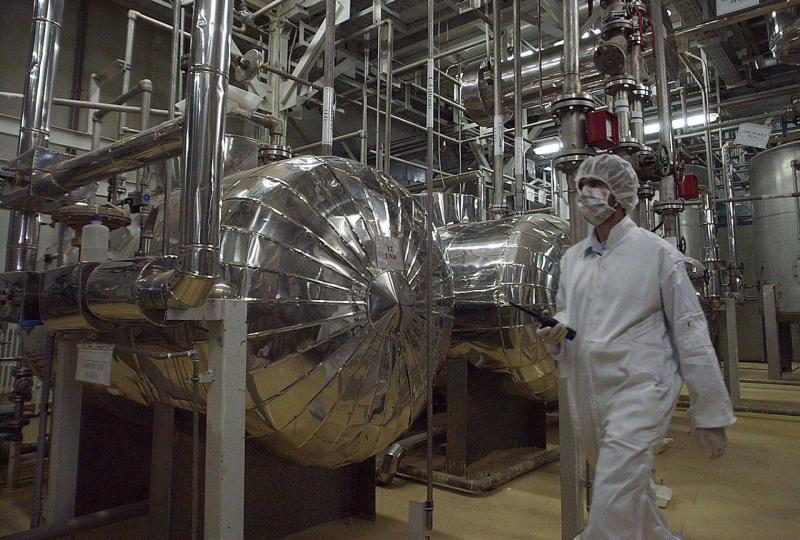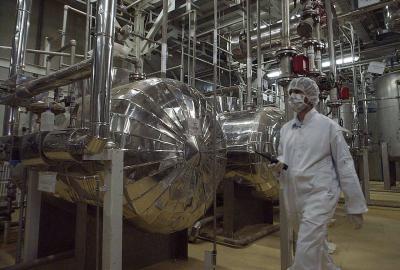Qatar wants to leverage the prisoner exchange agreement between the U.S. and Iran, facilitated by its months-long mediation, to create a common ground concerning the more contentious issue between the two rivals: the dispute over Iran's nuclear program. While the war in Ukraine tops the agenda at the UN General Assembly, Iran's nuclear ambitions cast a shadow over the Middle East and raise concerns in the West. As the dispute continues, Tehran steadily enriches more uranium and draws closer to Russia by supplying its military with drones.
Reaching a nuclear agreement with Iran appears a distant possibility, following five years since former U.S. President Donald Trump's withdrawal from an agreement that eased sanctions on Tehran in exchange for curbing its nuclear activities. The upcoming 2024 U.S. elections may darken these prospects. President Joe Biden is already facing criticism from Republicans over releasing $6 billion in Iranian assets as part of the prisoner exchange agreement.
However, Qatar, a small and very wealthy Gulf state with significant diplomatic ambitions, is pressuring both sides to engage in further talks and reach "understandings," according to three regional sources familiar with discussions that Doha has separately conducted with each side.
**Slowing Enrichment**
The three sources indicated that these understandings aim to slow the enrichment of uranium in Tehran while increasing international monitoring, limiting activities of Iran-aligned militias in the region, and halting Iran's export of drones, all in exchange for some relief from U.S. sanctions on Iranian oil exports. Qatari officials stated that they will hold separate meetings with Iranian and U.S. officials during the UN meetings in New York this week. An informed source indicated that these meetings would discuss uranium enrichment and Iranian drones.
The source added that Qatar aims to host indirect talks between Tehran and Washington should progress be made, following Doha's involvement in crafting the prisoner exchange deal through shuttle diplomacy between Iranian and American negotiators, who were staying at separate hotels in Doha.
**De-escalation**
Western and Iranian officials said the idea of understandings to prevent escalation, rather than a nuclear agreement that requires U.S. Congressional review, has been previously proposed. U.S. officials have never acknowledged pursuing such an approach. Washington suspects Tehran seeks the technology necessary to produce a nuclear weapon, while Iran insists this is not its goal.
When the prisoner exchange occurred between the U.S. and Iran on Monday, U.S. Secretary of State Antony Blinken left the door open for diplomacy regarding the nuclear issue, which he described as "possibly the number one concern," but stated that nothing was imminent. When asked if further indirect talks with Iran were possible soon, he said in New York, "We haven't addressed that at this time, but we will see in the future if there are opportunities."
Two Iranian sources familiar with the discussions indicated that indirect meetings between U.S. and Iranian officials in New York could pave the way for discussions on a "nuclear understanding." They added that Iran has never closed the door on nuclear diplomacy.
Another Iranian source involved in the discussions with Qatar said, "Considering the upcoming U.S. elections, it is possible to reach an understanding that includes issuing exemptions in the banking and oil sectors, allowing Iran to export its oil freely and recover its money through the banking system," which is currently prohibited under U.S. sanctions.
A senior U.S. administration official responded on Sunday to a question about whether any indirect talks with Iranians were planned on the margins of the UN General Assembly meetings in New York, stating, "You are asking if there are any scheduled talks this week, certainly not." It was unclear whether the official meant to deny any indirect talks or to leave the door open for them.
**Sensitive Engagement**
Discussing any engagement with Iran is a sensitive matter in the U.S., as the storming of the U.S. embassy in Tehran in 1979, where 52 Americans were held hostage for 444 days, still casts a shadow over Washington's relations with the Islamic Republic. U.S. officials kept details of the prisoner exchange agreement on Monday under wraps until the flight carrying the five released Americans took off from Tehran.
Sources had earlier informed Reuters that indirect talks in Qatar that led to the prisoner exchange occurred after broader discussions on Iran's nuclear program stalled. At that time, Tehran demanded guarantees that the new agreement would not be terminated again, a request that an Iranian source said had now been abandoned. The three regional sources noted that Iranian officials showed signs of willingness to make concessions during talks if U.S. sanctions that crippled their economy were eased.
These sources stated that Tehran had already committed to reducing uranium enrichment to 60 percent, below the nearly 90 percent needed to make a nuclear weapon, and showed readiness to resume cooperation with the UN's International Atomic Energy Agency, which monitors its nuclear activities. Reports reviewed by Reuters this month indicated that Iran had already reduced its uranium enrichment rate to 60 percent, but its stockpile continued to grow.
Regional diplomats mentioned another positive sign: Iranian proxies have not launched major attacks on U.S. or allied interests in the region in recent months, with the last significant incident occurring in Syria in March, when the Pentagon blamed Iran-backed militants for an attack on U.S. forces there.
However, much could depend on the U.S. elections next year, as Democratic President Biden once again competes against Trump, who currently leads the race for the Republican nomination. A diplomat remarked, "What would be the benefit of making Washington more enticing for Tehran before the elections, especially in a fierce contest where Republican competitors will pounce on any deal that seems to harm U.S. interests?"
Nevertheless, the West remains concerned about Tehran's nuclear activities. Experts have indicated that the 2015 agreement, which Trump described as the "worst deal ever," delayed Iran's nuclear program enough to keep it about a year away from the technology needed to produce a nuclear bomb. A senior diplomat in the region stated, "When no one wants a crisis, it is a good time to negotiate from now until the U.S. elections."




